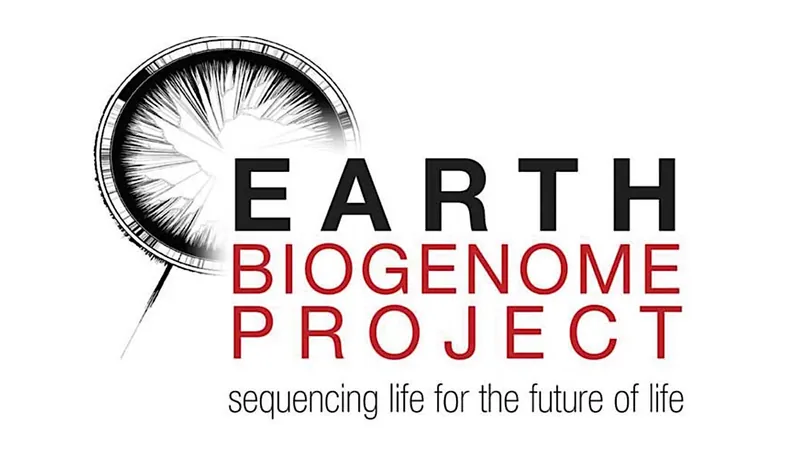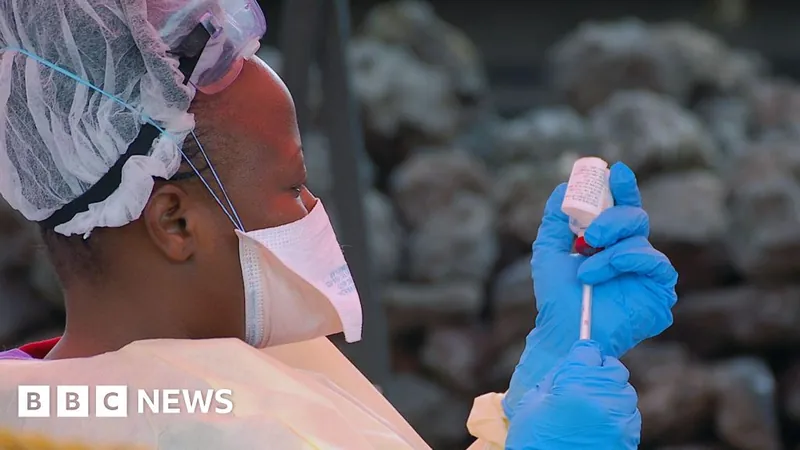
Earth BioGenome Project: A Bold Move to Map Life on Our Planet
2025-09-05
Author: Wei Ling
Unlocking the Secrets of Life
Get ready for a groundbreaking initiative! The Earth BioGenome Project (EBP)—a colossal collaboration of scientists from over 88 countries—is on a mission to decode the genomes of Earth’s eukaryotes. This ambitious project aims to create a digital library of DNA sequences that will safeguard our planet's biodiversity and fight environmental challenges.
A Global Effort with Local Impact
With more than 2,200 scientists onboard, including vibrant local and Indigenous research communities from the Global South, EBP is poised to revolutionize food security, advance medical and agricultural breakthroughs, and bolster our understanding of biodiversity vital for conservation and pandemic preparedness.
A Biological Moonshot
Launched in 2020, the EBP is now sequencing genomes at an impressive pace—10 times faster than before! Innovative solutions, such as portable ‘pop-up’ labs, are being deployed to enhance sequencing capabilities, especially in biodiversity-rich but remote areas.
"As biodiversity loss accelerates, our work must keep pace," said Prof. Harris Lewin from Arizona State University. "Our digital 'genome ark' is transforming genomics from costly, limited projects into a scalable global enterprise that includes everyone."
Pioneering Discoveries for the Future
By the end of 2024, EBP aims to have sequenced 1,667 genomes across 500 eukaryotic families, with nearly 3,500 genomes in total. The insights gained have enriched our knowledge of life's origins and adaptations, such as how Svalbard reindeer thrive in Arctic conditions and how butterflies have evolved.
Phase II: A Race Against Time
Now entering its second phase, EBP has set an audacious target: sequence 150,000 species—half of known genera—within four years. This phase prioritizes species crucial for ecosystem health, food security, and the well-being of Indigenous and local communities.
Empowering Local Scientists with Innovation
To achieve its goals, EBP intends to collect 300,000 samples, requiring a staggering 3,000 new genomes sequenced monthly. Luckily, advances in technology have made genome sequencing eight times cheaper than it was a few years ago, making this monumental task more feasible.
The initiative’s authors highlight challenges such as coordinating the global efforts of collecting species and ensuring an equitable data infrastructure. With a significant portion of Earth's biodiversity concentrated in the Global South, local researchers will play a pivotal role.
Enter the ‘genome lab in a box’ (gBox)—self-contained sequencing lab units that can be deployed in remote areas. Professors involved in the project believe these labs will significantly empower local scientists, allowing them to gather and analyze genetic data on-site for immediate conservation efforts.
A Vision for Global Equity in Science
"The gBox isn’t just a laboratory; it symbolizes equity in science," emphasized Prof. Montserrat Corominas. By equipping local and Indigenous researchers with advanced tools, the EBP aims to ensure that biodiversity science is genuinely inclusive and culturally relevant.
Investing in Our Planet's Future
EBP isn’t just a science project—it's a commitment to our planet's future. With a Phase II budget of $1.1 billion, including a foundational $500 million impact fund, this project stands to deliver immense benefits for generations to come.
Overall, the estimated cost to decode all eukaryotic species in the next decade is about $4.42 billion, a modest price compared to previous landmark scientific efforts.
Join the Movement!
The Earth BioGenome Project is more than a scientific endeavor; it's a bold vision for a sustainable future. As we embark on this journey to unveil the tree of life, we invite everyone to join in, as together we can protect and preserve the rich tapestry of life on Earth.


 Brasil (PT)
Brasil (PT)
 Canada (EN)
Canada (EN)
 Chile (ES)
Chile (ES)
 Česko (CS)
Česko (CS)
 대한민국 (KO)
대한민국 (KO)
 España (ES)
España (ES)
 France (FR)
France (FR)
 Hong Kong (EN)
Hong Kong (EN)
 Italia (IT)
Italia (IT)
 日本 (JA)
日本 (JA)
 Magyarország (HU)
Magyarország (HU)
 Norge (NO)
Norge (NO)
 Polska (PL)
Polska (PL)
 Schweiz (DE)
Schweiz (DE)
 Singapore (EN)
Singapore (EN)
 Sverige (SV)
Sverige (SV)
 Suomi (FI)
Suomi (FI)
 Türkiye (TR)
Türkiye (TR)
 الإمارات العربية المتحدة (AR)
الإمارات العربية المتحدة (AR)